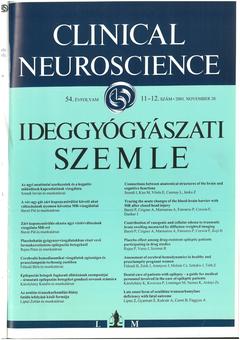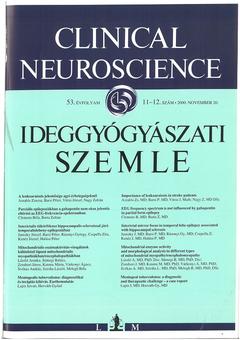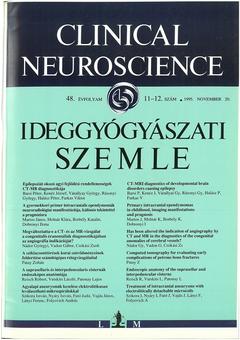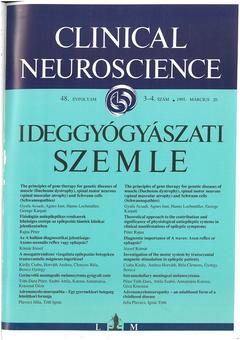Az eLitMed.hu orvostudományi portál a böngészés tökéletesítése érdekében cookie-kat használ.
Ha bővebb információkat szeretne kapni a cookie-k használatáról és arról, hogyan módosíthatja a beállításokat, kattintson ide: Tájékoztató az eLitMed.hu Cookie-használatáról.
Részletes keresés
Kérjük, állítsa be a paramétereket!
Találatok száma: 65
„Az agytól - az elmén át - a társadalomig” XIII. Nemzetközi Semmelweis-szimpózium Absztraktok
Endogenous cannabinoids are very important regulators of the central nervous system. Their role in hormone system was validated in the prolactin release at the pituitary level. Exogenous cannabinoids also affect multiple hormonal systems including the hypothalamo-pituitaryadrenocortical (HPA) axis.
[The role of the blood-brain barrier in the pathogenesis of neonatal and ischaemic brain injuries: investigations using animal models]
[A PDF csak angol nyelven érhető el.]
Kongresszusi beszámoló - Pannonian symposium on CNS injury
A „Pannonian Symposium on Central Nervous System Injury"-t az Idegsebészeti Klinika 2000. augusztus 17. és 20. között szervezte meg Pécsett, a Hotel Palatinus Bartók-termében. Bár a kongresszus a Magyar Orvosok Millenniumi V. Világtalálkozója szattelitarendezvényeként került meghirdetésre, az esemény végül önmagában három estén és két napon át biztosított tudományos és társasági programot a tizenkét országból érkezett mintegy 140 résztvevő számára.
NEUROLOGY ROUND: NEUROPEPTIDES lntroduction
The concept of peptide secretion by neurons was first proposed by Scharrer and Scharrer in 1940, but only recently have more detailed characteristics of the peptide neuron emerged. The revelation of endogenous opioid peptides in mammalian brain, and establishment of the ubiquitous presence of many other neuroactive peptides throughout the central nervous system during the mid 1970-s, introduced new dimensions into mammalian neurobiology.
A Free Radical Scenario ln Multiple Sclerosis
Multiple Sclerosis (MS) is a demyelinating disorder of the central nervous system (CNS) that has so far eluded auempts to determine it's cause. It could be that there isn't any one cause to determine. And so, as with many other multivariate nonlinear disorders, numerous epidemiological studies have been carried out to help identify possible modifying factors in the disease and the genetic linkages involved, not just to discover the etiology but also to help patients in need.
1.
2.
3.
Ideggyógyászati Szemle Proceedings
Egészségügyi szakmai irányelv az akut ischaemiás stroke diagnosztikájáról és kezeléséről4.
5.
1.
2.
Klinikai Onkológia
A rosszindulatú daganatok fenotípusának plaszticitása és az immunogén mimikri3.
Klinikai Onkológia
A szarkopénia mérése komputertomográfiával és jelentősége az onkológiai betegeknél4.
5.







